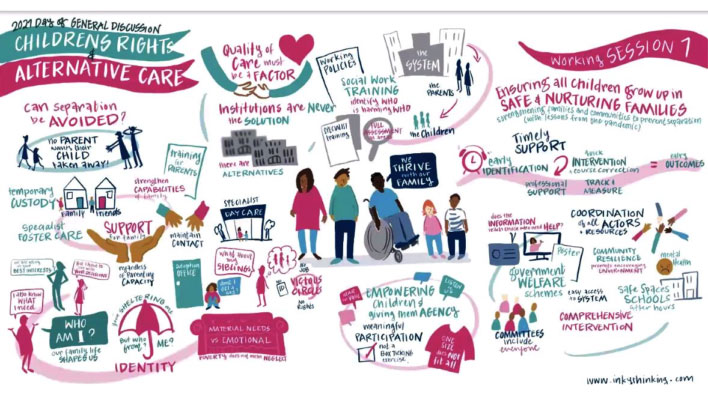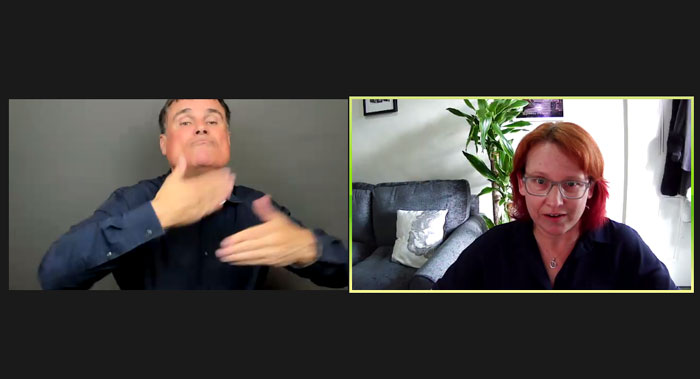A System of “Care” That Harms Children

We often think that “care” or “foster care” protects children from parents who hurt them. In fact, however, the state often removes children from loving families simply because they are poor. Ironically, a system meant to protect children ends up causing them immeasurable harm.
Dr. Gill Main studies child poverty in the UK and recently helped ATD-UK interview children and young people who have been in care. Separating children from siblings and parents can cause life long psychological damage, they found.

“Few of us would tolerate being torn from everyone we know”, Dr. Main insists. “Why on earth do we think this is acceptable for children?” Real protection, she says, would give children and young people a say in what happens to them. This article is adapted from Dr. Main’s remarks to a UN Committee* on this issue.
The “untold damage” of severed relationships
Relationships are vital to all of us–including children. Decisions around alternative care tend to focus on parent-child relationships. But children also have relationships with siblings, wider family, peers, teachers, and so on. Sibling relationships were raised again and again by young people in the interviews. These sibling bonds are at the core of young people’s identities–especially if they can’t live with their parents.
Yet alternative care placements often place siblings separately, remove some siblings but not others, and move children away from friends, peer groups, and family networks. This does untold damage both in the present and for children’s future lives and well-being. We often focus on the long-term damage – but children are also important as people, here and now.
Few of us would tolerate being torn from everyone we know, being told we can’t see certain people, and being denied information about ourselves–why on earth do we think this is acceptable for children?
…[C]hild protection interventions should be redesigned with an equal emphasis on all the relationships which children themselves identify as important.
Punished for being poor
…[A] huge force in the UK shaping which families are separated is poverty. Our government has systematically slashed the financial support available to families, resulting in families being unable to provide adequately for themselves, and in unendurable stress created by managing inadequate budgets.
- Families are then punished by being told that they are neglecting children–when in reality they are doing their best in an impossible situation.
“Poverty-aware” social work
The ideal solution would be that the government ensures all families have what they need to survive. But given recent cuts to [government programs] this seems a long way off. So while we work towards that, we need to make sure that social workers are trained to be ‘poverty aware’.
One example of what this looks like is in Leeds City Council, where social workers can now indicate that poverty, rather than abuse or neglect, is the cause of a child protection concern.
It also looks like embedding the expertise of children, young people, and parents in all social worker training, so that social workers can better differentiate between the harms that might be done by parents, and the harms being done to parents and children by the state.
Pay parents instead of foster care
We serve no one by removing children from loving parents–who may be experiencing poverty, mental health issues, or other difficulties–and paying foster carers to provide temporary care for them.
- Simply redirecting that money to providing adequate incomes and high quality support and health care would produce better outcomes for everyone.
Children, young people, and parents who have lived it are the most important experts in the alternative care system. [They] don’t get to stop thinking about these issues when they go home for the night. Yet children’s expertise and preferences are so often ignored.
The children and young people we spoke to said that adults tell them that this is to protect them. Yet every single care experienced young person we spoke to had damaging experiences in care, ranging from bullying and exclusion to abuse.
Protecting children means giving them a say in their lives
Protection cannot be achieved without participation–it doesn’t work. The ways that child participation is built into the current system in the UK is a one-size-fits-all box ticking exercise.
- This is often infuriating and damaging to children–to their trust in those who profess to care, to their self-esteem, and to their identity as an individual with rights who is worthy of respect.
We need to completely overhaul these systems, starting by talking to children and families–for a long time, and with a mentality of restoring the harms that the system has done to them.
Then we will be able to co-create systems in which meaningful participation is possible. What that looks like is not predictable and must never become static or a blanket policy.
ATD Fourth World and related work I have done with children and young people in poverty have the tools we need for this process. And we’re ready to go as soon as we have the resources and the commitment from policy makers and practitioners that this input will be respected and used.
*ATD Fourth World consulted with children and young people who have been in care for a report to the United Nations Committee on the Rights of the Child. Read more about what they said here and here.
Dr. Gill Main, Professor of Childhood, Youth and Social Justice at the University of Leeds in the United Kingdom.

